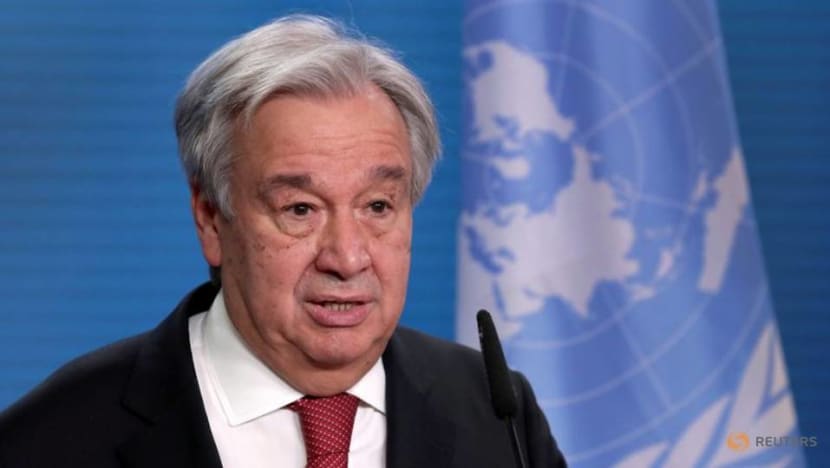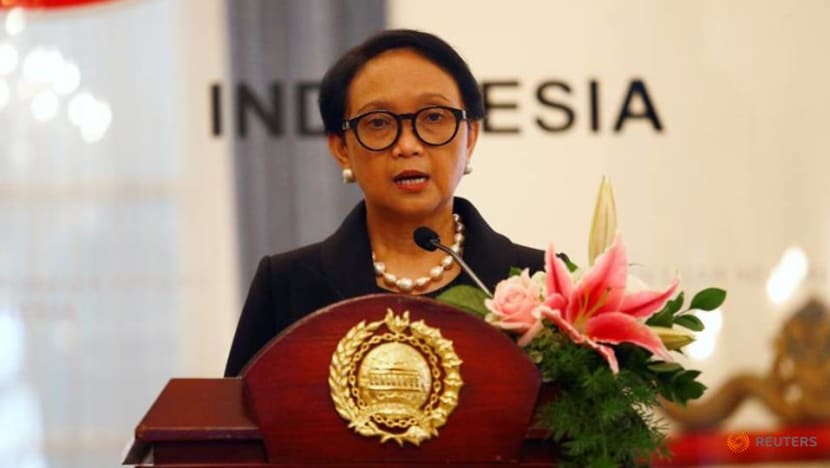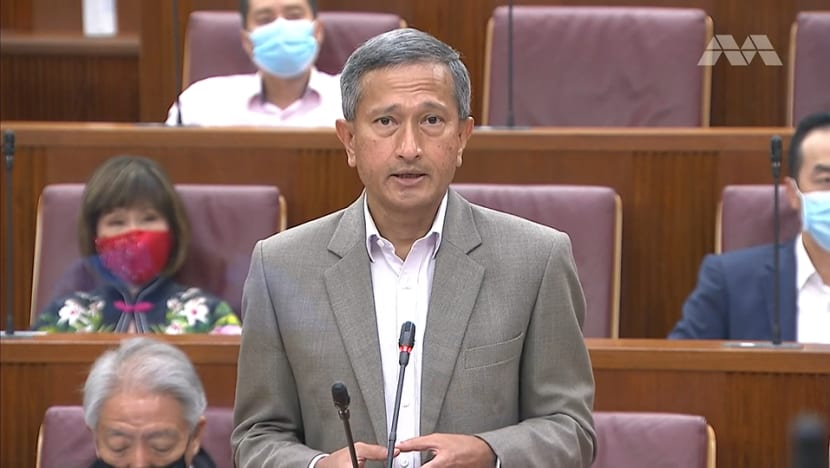commentary Commentary
Commentary: Has Myanmar coup sparked rethinking on non-interference among ASEAN countries?
Stronger words from Indonesia, Singapore and other ASEAN countries may seem new but do not supplant the important and consistent behind-the-scenes diplomatic work, says Dr Nehginpao Kipgen,

Myanmar Commander in Chief Senior General Min Aung Hlaing salutes as he attends an event marking the anniversary of Martyrs' Day at the Martyrs' Mausoleum in Yangon on July 19, 2016. (Photo: REUTERS/Soe Zeya Tun)
NEW DELHI: It’s no surprise Myanmar’s coup is testing the patience of the international community.
Protesters have called for external intervention, following three deaths. After being sprayed by water cannons, rubber bullets and more, they expect an imminent use of more lethal force by the military.
But the international community has – unsurprisingly – been unable to launch a coordinated approach, apart from the expected strongly worded statements from the UN Security Council on Feb 4 and the UN Human Rights Council on Feb 12.
UN Secretary-General Antonio Guterres and other world leaders may have condemned the military’s brutality over this past week.

But that only went as far as to elicit a response from the Myanmar foreign ministry on Feb 22 that authorities were “exercising utmost restraint” in refuting the condemnations and calling them a “flagrant interference” in Myanmar’s internal affairs as a sovereign country.
STRONGER WORDS FROM ASEAN
What has raised some eyebrows, however, is the stern, finger-wagging words of Myanmar’s closer Southeast Asian compatriots.
Malaysia views the political situation in Myanmar as a “serious” development and a “step backwards in the country’s democratic process”, Prime Minister Muhyiddin’s Yassin said, warning that the political unrest there could “affect peace and stability in the region” on Feb 4 during his visit to Indonesia.
READ: Commentary: A crackdown in Myanmar could spark a humanitarian crisis
Calling the situation “alarming”, Singapore Foreign Minister Vivian Balakrishnan also warned of serious consequences for Myanmar and the region if the situation continued to escalate in his response to a Parliament question on Feb 16.
Even Thailand, which has a history with military coups, called for ASEAN nations to take a “collective stand” on the issue.
The ground may have further shifted after two protesters were killed over the weekend after police opened fire on demonstrations, with the Singapore Ministry of Foreign Affairs calling the use of lethal weapons against civilians “inexcusable” on Feb 20.
READ: Commentary: How Myanmar’s military leveraged the COVID-19 pandemic in its power grab
Both Singapore and Indonesia Foreign Affairs Ministers expressed grave concern over ongoing developments in discussing further steps for ASEAN to take in addressing the situation in Myanmar earlier on Feb 18.
Indonesian Foreign Minister Retno Marsudi also emphasised on Tuesday (Feb 23) that Myanmar’s transition to democracy should follow the wishes of its people and urged for ASEAN to double efforts to mediate between the junta and protesters.

WHAT’S BEHIND STRONGER WORDS
To some extent, Indonesia and Malaysia’s stronger words for Myanmar have come as less of a surprise, given their consistently tough stance on the country to take responsibility for the Rohingya crisis and get their house in order or face repercussions.
They have come under strong pressure to take this position since 2017 from the Organization of Islamic Cooperation, which also pushed for the Rohingya case to be heard at the International Court of Justice last year.
And while many observers have highlighted that Singapore’s rhetoric on Myanmar’s coup seemed unusually aggressive, history shows Singapore has taken a consistent, principled stance premised on the rule of law and national responsibility for internal issues. Its position on the Rohingya crisis is instructive.
READ: Commentary: To be president? What Myanmar military leader's endgame may be
“To be brutally honest, this is a man-made humanitarian disaster and something which should not be happening in this day and age,” Dr Balakrishnan had said in October 2018 when pressed on ASEAN’s efforts to resolve the situation in Rakhine.
Indeed, while keen observers point to the lack of reference to the Rohingya crisis in ASEAN statements, during Singapore’s chairmanship in 2018, ASEAN countries worked hard, far away from the media spotlight, to secure Myanmar’s commitment in taking concrete steps.
ASEAN must be given credit in pushing to facilitate the voluntary return of displaced people and the implementation of recommendations by the Advisory Committee on Rakhine State headed by former UN Secretary-General Kofi Annan.
Similar behind-the-scenes shuttle diplomacy has been at play over the past two weeks, with Indonesia spearheading efforts with other ASEAN foreign ministers to find a resolution to the crisis.
READ: Commentary: Myanmar military’s leverage is actually waning, despite appearances
Ms Marsudi has been travelling across Southeast Asia to rally support from ASEAN members for a special summit to discuss next steps. She may also be leading more back-channel talks with the Tatmadaw to find a compromise and prevent further violent crackdowns.
CAREFUL NOT TO OVERPLAY
Indeed, ASEAN countries are clear-eyed and know they cannot publicly push too forcefully given the lack of unanimity on the approach to take within the grouping.
They are also well aware actions on their part could look like foreign interference into domestic politics even to anti-coup protesters, after remarks that Indonesia is pushing for ASEAN to send election monitors if the junta holds national polls sparked threats of demonstrations at the Indonesian Embassy in Yangon on Feb 23.
ASEAN countries know they must be careful not to overplay their hand and put too much pressure on Myanmar or suggest that they can offer solutions to the country’s complex troubles.
For one, they may be drawn into debates on how far they may be willing to go to back up their rhetoric, where the reality is that most have significant commercial interests in Myanmar, particularly Singapore, the biggest investor bringing in more than S$24 billion of capital in 2019.
Dr Balakrishnan had to walk a tightrope in clarifying that he would not presume to tell the Singapore business community what to do following the coup in urging against the use of widespread sanctions.

“I am sure companies making commercial decisions and investment decisions will also pay attention to the political context of the venue in which they are seeking to invest in.”
WHAT ASEAN BRINGS TO THE TABLE
ASEAN should also guard against getting drawn into the power play as major countries and segments of the international community search for levers to exert greater pressure on Myanmar.
The US knows its actions, even combined with other western countries, will not move the needle on Myanmar, and seek to build a coordinated international approach whereby ASEAN plays a leading role.
There are signs this is underway, when White House National Security Adviser Jake Sullivan spoke with ambassadors from ASEAN, urging them to support for the “immediate restoration” of democracy in Myanmar and Secretary of State Antony Blinken doing the same with his counterparts.
READ: Commentary: US sanctions on Myanmar will not reverse the coup
The Americans know Myanmar will be more willing to listen and engage with neighbouring ASEAN states, given the country’s strong anathema to Western interference, seen during the relief efforts for the 2008 Cyclone Nargis disaster.
The regional bloc’s freshly created ASEAN Humanitarian Task Force for Victims of Cyclone Nargis (AHTF) played a leading role in helping to coordinate international relief and rehabilitation efforts.
Moreover, Washington understands an advantage in ASEAN taking the lead is the grouping’s ability to rally the support of both China and Russia.
READ: Commentary: Myanmar coup poses first foreign policy test for Biden on Southeast Asia
BEST HOPE YET
ASEAN countries may wax and wane in how stern an approach they take towards member-states like Myanmar where difference arise, but this will not be the last time Southeast Asian countries express harsher positions than expected.
Former Singaporean senior diplomat Bilahari Kausikan had already highlighted how ASEAN membership should not be taken as granted and can be revoked if actions of member-states grow detrimental to the bloc’s collective interests.
More importantly, something horrible has gone wrong in Myanmar and the pressure cannot let up.
This was a usurping of power by the military against the wishes of the overwhelming majority of voters. A democratically elected government was pushed aside on unsubstantiated electoral allegations.
There may be limitations on what ASEAN can conceivably achieve since any dialing back of the clock and return to democracy lies in the hands of the Tatmadaw. But ASEAN is still the world’s best hope of nudging the situation in Myanmar.
SIGN UP: For CNA’s Commentary weekly newsletter to explore issues beyond the headlines
Dr Nehginpao Kipgen is a Political Scientist, Associate Professor and Executive Director at the Center for Southeast Asian Studies, Jindal School of International Affairs, O P Jindal Global University. He is the author of three books on Myanmar, including Democratization of Myanmar.














